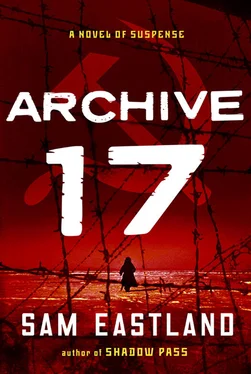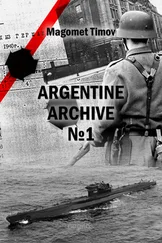Sam Eastland - Archive 17
Здесь есть возможность читать онлайн «Sam Eastland - Archive 17» весь текст электронной книги совершенно бесплатно (целиком полную версию без сокращений). В некоторых случаях можно слушать аудио, скачать через торрент в формате fb2 и присутствует краткое содержание. Жанр: Исторический детектив, на английском языке. Описание произведения, (предисловие) а так же отзывы посетителей доступны на портале библиотеки ЛибКат.
- Название:Archive 17
- Автор:
- Жанр:
- Год:неизвестен
- ISBN:нет данных
- Рейтинг книги:3 / 5. Голосов: 1
-
Избранное:Добавить в избранное
- Отзывы:
-
Ваша оценка:
- 60
- 1
- 2
- 3
- 4
- 5
Archive 17: краткое содержание, описание и аннотация
Предлагаем к чтению аннотацию, описание, краткое содержание или предисловие (зависит от того, что написал сам автор книги «Archive 17»). Если вы не нашли необходимую информацию о книге — напишите в комментариях, мы постараемся отыскать её.
Archive 17 — читать онлайн бесплатно полную книгу (весь текст) целиком
Ниже представлен текст книги, разбитый по страницам. Система сохранения места последней прочитанной страницы, позволяет с удобством читать онлайн бесплатно книгу «Archive 17», без необходимости каждый раз заново искать на чём Вы остановились. Поставьте закладку, и сможете в любой момент перейти на страницу, на которой закончили чтение.
Интервал:
Закладка:
He needed to get rid of Pekkala.
This decision was not made out of any particular love for Klenovkin, but rather because Gramotin had, over the years, created a fine-tuned balance between himself and the commandant.
At the heart of this arrangement was the fact that Klenovkin could not run this camp without Gramotin’s particular talent for hostility. No one could stay as permanently angry as Gramotin. It was a gift which amazed even Gramotin himself.
Klenovkin had learned to leave all matters of camp discipline entirely to Gramotin’s discretion, in return for which Gramotin could do whatever he wanted without fear of repercussions.
It was the kind of life Gramotin had always dreamed of living, and the only thing that had worried him until now was that someone might see through his mask of rage to the pride he took in his work and the contentment it afforded him each day.
But if Klenovkin really did fall apart, instead of merely threatening to as he did at least once every week, Dalstroy would replace him. If that happened, Gramotin knew he’d have to start from scratch grooming a new commandant. It was a task which might take years.
And suppose, Gramotin asked himself, this new man does not appreciate my particular talents? He might change things around, or even transfer me to another camp. The idea left Gramotin nauseous with anxiety.
He could not allow it to happen. The sooner Pekkala was dead, the quicker things could go back to the way they’d been before. Besides, this prisoner made him uneasy in a way no other convict had. Looking Pekkala in the eye felt like staring down the barrel of a gun.
Killing a prisoner was easy, but disposing of Pekkala had to be done without implicating the commandant. The safest way to accomplish that was to make sure Klenovkin knew nothing about it. At the same time, Gramotin would have to avoid bringing down a Dalstroy board of inquiry upon himself. Someone else would need to be the instrument of Pekkala’s doom. After many hours of plotting, Gramotin believed he’d at last found a perfect candidate.
“You don’t want anything?” Melekov narrowed his eyes with suspicion. “Then what are you doing here?”
“I just wanted to see how you are enjoying your last few days in the kitchen.”
“Last days?” Melekov laughed. “What are you talking about?”
Gramotin shrugged. “I hear you are going to be replaced.”
The blood drained out of Melekov’s face. “By whom?”
“That prisoner Klenovkin sent to work in here, 4745, the one who delivers his breakfast.”
“But that’s ridiculous!” spat Melekov.
“Is it? Why do you think Klenovkin sent someone to work with you in the kitchen? Has he ever done that before?”
“Well, no, but …”
“And why do you think he has that convict delivering his breakfast instead of you?”
“I don’t know.”
“Well, think about it! That convict goes into his office. Every day. Did you ever go into his office?”
“No,” admitted Melekov.
“And they talk. I’ve heard them. Did you ever talk to Klenovkin?”
“Of course!”
“In an actual conversation?”
“Well, no, I wouldn’t say that exactly.”
“Pekkala is going to replace you. And do you know why?”
Melekov shook his head. He looked miserable.
“So Klenovkin doesn’t have to pay you!” announced Gramotin. “And, of course, he doesn’t have to pay the convict either. Think of how much money he will save Dalstroy. He’s been after a promotion for years and this time he might just get it!”
“That bastard!” The scrap of newspaper fell from Melekov’s hands. “But what am I supposed to do?”
“That’s your problem,” spat Gramotin. “At least, it will be if that prisoner isn’t stopped.”
“Stopped? What do you mean?”
Gramotin slapped him on the back of the head. “I mean prevented from taking your job! And what could possibly prevent him?” He leaned closer and lowered his voice. “Perhaps an accident. So many accidents can happen in a kitchen.”
“Yes,” agreed Melekov. “Many things can go wrong.…”
“And the sooner the better, my friend, before things start going wrong for you.”
Poskrebyshev knocked once and, without waiting for a reply, walked into Stalin’s office. He held up a sheet of yellow telegraph paper. “Major Kirov has sent a reply to Borodok.”
Stalin looked up blearily from the file he had been reading. “When was it intercepted?”
“Less than an hour ago, by NKVD signals headquarters in Omsk.”
Stalin held out his arm and snapped his fingers. “Give it to me.”
Poskrebyshev handed over the transcript, then stood back while Stalin squinted at the tiny print.
“The Blue File!” he bellowed. “Of course! I should have known.”
“What is the Blue File, Comrade Stalin?”
Stalin ignored him. “How did Pekkala know to look in Archive 17?” he wondered aloud. “How did he know that the Blue File had even survived?”
Poskrebyshev did not reply, fearing another lecture on the word rhetorical .
“This Captain Ryabov must have been a special agent of the Tsar. That proves he did not trust Kolchak. And he was right! In such a situation, no one can be trusted.” Resting one elbow on the desk, Stalin placed his forehead against his palm. “I should never have sent Pekkala back to Borodok. He must have known all along what this was really about.”
“Is Pekkala in danger, Comrade Stalin?”
Stalin brushed away the words as if they were flies buzzing around his head.
“What about Savushkin, the bodyguard you sent to protect him?”
“Pekkala might have won him over,” answered Stalin, still talking more to himself than to Poskrebyshev. “After all, Savushkin volunteered to work with Pekkala. I should have taken that into consideration.”
“Won him over? But why, Comrade Stalin, and with what?”
“Threats. Bribes. Some act of Finnish sorcery! And as for why, perhaps Pekkala’s loyalties to the past are stronger than I thought. I see now that Pekkala has been hiding. All this time, he has concealed himself in a disguise of incorruptibility. They were good at disguises, those agents of the Tsar. Vassileyev taught them well. But now I see Pekkala as he really is. He can no longer hide from me!”
“Comrade Stalin,” Poskrebyshev pleaded with him, “there is no evidence to suggest that what you are saying is true.”
“Evidence!” Stalin roared. “The evidence was right under our noses the whole time, hidden away in Archive 17. And that is where it should have stayed. Who is in charge there? Who is responsible for releasing the information?”
“That would be Professor Braninko.”
“Get me Kornfeld. Tell him he has work to do.”
Pekkala stood at the entrance to the mine, waiting to deliver the soup ration.
At last a man appeared, ghoulish in his coating of radium. When he caught sight of Pekkala, he raised his hand in greeting.
“I brought your soup,” said Pekkala.
“Don’t you recognize me?” asked the stranger.
“I’m sorry, Zeka, I do not,” replied Pekkala, using the common name by which prisoners addressed each other. The stranger’s face was so caked in yellowy powder that it reminded Pekkala of masks he once saw used by a troupe of Japanese Kabuki actors at the Aksyonov Theatre in St. Petersburg.
“It’s me!” The prisoner slapped his hands against his chest, sending puffs of yellow dust into the air. “Savushkin!”
Pekkala leaned forward, squinting. “Savushkin?” The man who stood before him now bore no resemblance to the friend he had made on the journey to Siberia. Savushkin’s shirt was open at the neck, revealing flesh stretched so tightly against the collarbone it looked as if the slightest movement would cause his skin to tear like wet paper.
Читать дальшеИнтервал:
Закладка:
Похожие книги на «Archive 17»
Представляем Вашему вниманию похожие книги на «Archive 17» списком для выбора. Мы отобрали схожую по названию и смыслу литературу в надежде предоставить читателям больше вариантов отыскать новые, интересные, ещё непрочитанные произведения.
Обсуждение, отзывы о книге «Archive 17» и просто собственные мнения читателей. Оставьте ваши комментарии, напишите, что Вы думаете о произведении, его смысле или главных героях. Укажите что конкретно понравилось, а что нет, и почему Вы так считаете.











